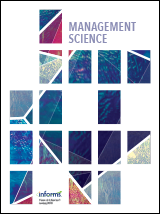Academic articles
Practitioner articles
Working papers
Books
Book chapters
Case studies
Other publications
Subject(s)
Human resources management/organizational behavior
Keyword(s)
Crowdsourcing data analysis, scientific transparency, research reliability, scientific
robustness, researcher degrees of freedom, analysis-contingent results
robustness, researcher degrees of freedom, analysis-contingent results
In this crowdsourced initiative, independent analysts used the same dataset to test two hypotheses regarding the effects of scientists’ gender and professional status on verbosity during group meetings. Not only the analytic approach but also the operationalizations of key variables were left unconstrained and up to individual analysts. For instance, analysts could choose to operationalize status as job title, institutional ranking, citation counts, or some combination. To maximize transparency regarding the process by which analytic choices are made, the analysts used a platform we developed called DataExplained to justify both preferred and rejected analytic paths in real time. Analyses lacking sufficient detail, reproducible code, or with statistical errors were excluded, resulting in 29 analyses in the final sample. Researchers reported radically different analyses and dispersed empirical outcomes, in a number of cases obtaining significant effects in opposite directions for the same research question. A Boba multiverse analysis demonstrates that decisions about how to operationalize variables explain variability in outcomes above and beyond statistical choices (e.g., covariates). Subjective researcher decisions play a critical role in driving the reported empirical results, underscoring the need for open data, systematic robustness checks, and transparency regarding both analytic paths taken and not taken. Implications for organizations and leaders, whose decision making relies in part on scientific findings, consulting reports, and internal analyses by data scientists, are discussed.
With permission of Elsevier
Volume
165
Journal Pages
228–249
Subject(s)
Economics, politics and business environment; Information technology and systems; Technology, R&D management
Keyword(s)
AI, artificial intelligence, privay, data protection, information law
The European Commission has presented proposals for the horizontal regulation of artificial intelligence. It is thus foreseeable that the regulatory systems of data protection and IT security will be supplemented by a further cross-sectoral approach to the regulation of information technology. This article explains the proposals and describes their advantages and disadvantages.
[Die Europäische Kommission hat Vorschläge vorgelegt, wie eine horizontale Regulierung künstlicher Intelligenz erfolgen soll. Damit ist absehbar, dass neben die Regulierungssysteme des Datenschutzes und der IT-Sicherheit ein weiterer sektorübergreifender Ansatz zur Regulierung von Informationstechnik treten wird.]
[Die Europäische Kommission hat Vorschläge vorgelegt, wie eine horizontale Regulierung künstlicher Intelligenz erfolgen soll. Damit ist absehbar, dass neben die Regulierungssysteme des Datenschutzes und der IT-Sicherheit ein weiterer sektorübergreifender Ansatz zur Regulierung von Informationstechnik treten wird.]
Volume
45
Journal Pages
438–443
ISSN (Online)
1862-2607
ISSN (Print)
1614-0702
Subject(s)
Diversity and inclusion; Human resources management/organizational behavior
Keyword(s)
Random selection, diversity bonus, luck, decision biases, paradox of merit, learning traps
Complex tasks often cannot be addressed with expertise, but instead by assembling a diverse cognitive repertoire in teams. In such cases, engaging diversity may enhance performance. Yet various behavioral and social limits often deter organizations from recognizing or integrating valuable diversity. I argue that random selection is an undervalued tool for capturing the diversity bonus because it helps address (1) the paradox of merit, by avoiding fruitless deliberation; (2) biased reasoning, by deciding on the basis of no reason; and (3) learning traps, by discovering self-confirming false beliefs. More generally, incorporating random selection in organizational design can generate a less-is-more effect: deciding by blind luck means exercising less control over outcomes but achieving more by saving time and resources, as well as detecting and sanitizing biased reasons.
Volume
10
Journal Pages
85–91
ISSN (Online)
2245-408X
Subject(s)
Economics, politics and business environment; Information technology and systems; Technology, R&D management
Keyword(s)
Transatlantic, data protection, internet of things, artificial intelligence, industrial control systems (ICS)
Volume
2
Journal Pages
77–92
ISSN (Online)
2662-9739
ISSN (Print)
2662-9720
Subject(s)
Economics, politics and business environment
Keyword(s)
sunk cost effect, sunk cost fallacy, endowment effect, cognitive ability, fluid intelligence, crystallized intelligence, reflective thinking, online experiment, online survey, psychological scales, scale validation, Raven’s progressive matrices, international cognitive ability resource, cognitive reflection test, openness
JEL Code(s)
D91, C83, C90
We provide experimental evidence of behavior consistent with the sunk cost effect. Subjects who earned a lottery via a real-effort task were given an opportunity to switch to a dominant lottery; yet 23% chose to stick with their dominated lottery.The endowment effect accounts for roughly only one third of the effect. Subjects’ capacity for cognitive reflection is a significant determinant of sunk cost behavior.We also find stocks of knowledge or experience (crystallized intelligence) predict sunk cost behavior, rather than algorithmic thinking (fluid intelligence) or the personality trait of openness. We construct and validate a scale, the “SCE-8”, which encompasses many resources individuals can spend, and offers researchers an efficient way to measure susceptibility to the sunk cost effect.
Volume
186
Journal Pages
318–327
Subject(s)
Finance, accounting and corporate governance
Keyword(s)
Association tests, non-random sampling, equity, returns, distribution matching, multiple imputation, resampling
JEL Code(s)
M41
Volume
26
Journal Pages
772–814
Subject(s)
Economics, politics and business environment
Keyword(s)
Overinvestment, capital budgeting, resource allocation, information asymmetry, optimal contracting
The literature on resource allocation under adverse selection has focused on models in which the resource being allocated is such that the privately informed agent always prefers more of it to less. We analyze a firm’s optimal resource allocation mechanism when this assumption does not hold and show that the resulting mechanism has a number of novel characteristics. For example, first best may be achievable even with nontrivial information asymmetry; when first best cannot be achieved, it is always optimal to overinvest relative to first best, and the most efficient agent may not earn rents, even when a less efficient agent does.
© 2020, INFORMS
Volume
67
Journal Pages
2657–3320
ISSN (Online)
1526-5501
ISSN (Print)
0025–1909
Subject(s)
Management sciences, decision sciences and quantitative methods
Keyword(s)
Intermediary problems, mechanism design, internet advertising, extensive form games, second-price auction, multi-stage intermediation
We consider a setting where online advertisers seek to acquire impressions from an advertising exchange through a multi-tier network of intermediaries, and study the mechanisms offered by the ad exchange and intermediaries when the advertisers’ values are private. As opposed to traditional manufacturer/retailer settings, intermediaries in display advertising auction off contingent goods which they only purchase when downstream buyers have signaled interest. Thus motivated, we determine how intermediaries should bid on behalf of their customers in the mechanism of an upstream intermediary and study how the structure of the intermediation network affects the profits of its participants. We provide a game theoretic model to study the mechanisms offered by the ad exchange and intermediaries within a practically relevant class of mechanisms. We characterize a subgame perfect equilibrium of the game among intermediaries and the seller, and show that the equilibrium mechanisms have a simple and appealing structure: intermediaries bid the virtual value associated with the maximum downstream report in the upstream intermediary’s mechanism, whenever this quantity is positive. We show that economic incentives are not necessarily aligned along the network and the position in the intermediation network has a significant impact on the profits of the intermediaries. Besides, we analyze the impact of different network structures on the seller’s revenue and investigate whether intermediaries have an incentive to merge horizontally or vertically.
Copyright © 2020, INFORMS
Volume
23
Journal Pages
714–730
ISSN (Online)
1526–5498
ISSN (Print)
1523-4614
Subject(s)
Strategy and general management; Technology, R&D management
Keyword(s)
Category contrast, invention, patents, search, attention
Research Summary
Whereas prior innovation and strategy literature studied how attentional and search dynamics influence the creation of inventions, we examine how these same processes affect the impact of inventions after their creation. We theorize that inventions classified in “high‐contrast” technological categories garner more attention by potential users and, hence, accrue more citations than otherwise‐equivalent inventions classified in “low‐contrast” categories. We test this hypothesis via three studies. First, we estimate citation‐count models among all USPTO patents granted between 1975 and 2010. Second, we conduct a “twin patents” test comparing inventions patented both at the USPTO and at the EPO. Third, we examine minute‐by‐minute search logs from a sample of USPTO examiners. These studies support our hypothesis and extend current understandings of attentional and search dynamics in the innovation process.
Managerial Summary
Patents that receive more citations tend to have greater economic value and greater impact on future technological developments. We show that the number of citations a patent receives does not only depend on its inherent technological value, but also on seemingly neutral classification decisions affecting the likelihood that it will be noticed by potential future users. We test our arguments via three related studies. Our results demonstrate that inventions classified in “high‐contrast” technology classes garner considerably more attention – and hence citations – than twin‐inventions classified in “low‐contrast” classes. The key managerial implication is that, whenever feasible, nudging an invention towards higher‐contrast classes will increase its future worth. The key policy implication is that maximizing categorical contrast across technology classes will help users identify relevant prior patents.
Whereas prior innovation and strategy literature studied how attentional and search dynamics influence the creation of inventions, we examine how these same processes affect the impact of inventions after their creation. We theorize that inventions classified in “high‐contrast” technological categories garner more attention by potential users and, hence, accrue more citations than otherwise‐equivalent inventions classified in “low‐contrast” categories. We test this hypothesis via three studies. First, we estimate citation‐count models among all USPTO patents granted between 1975 and 2010. Second, we conduct a “twin patents” test comparing inventions patented both at the USPTO and at the EPO. Third, we examine minute‐by‐minute search logs from a sample of USPTO examiners. These studies support our hypothesis and extend current understandings of attentional and search dynamics in the innovation process.
Managerial Summary
Patents that receive more citations tend to have greater economic value and greater impact on future technological developments. We show that the number of citations a patent receives does not only depend on its inherent technological value, but also on seemingly neutral classification decisions affecting the likelihood that it will be noticed by potential future users. We test our arguments via three related studies. Our results demonstrate that inventions classified in “high‐contrast” technology classes garner considerably more attention – and hence citations – than twin‐inventions classified in “low‐contrast” classes. The key managerial implication is that, whenever feasible, nudging an invention towards higher‐contrast classes will increase its future worth. The key policy implication is that maximizing categorical contrast across technology classes will help users identify relevant prior patents.
© 2021 Strategic Management Society
Volume
42
Journal Pages
992–1023
Subject(s)
Technology, R&D management
Keyword(s)
Appropriability, complementary assets, openness, innovation, open innovation, review, content analysis
This paper sheds fresh light on our 2010 paper How Open Is Innovation by taking into consideration notable developments in innovation over the last decade. The original paper developed four types of openness: sourcing, acquiring, selling, and revealing. Reflecting on important technological, organizational, and societal changes in the past decade, we highlight how these changes prompt novel questions for open innovation. While the core features of the original framework still stands, there are many new questions that have emerged in recent years. We end by chartering a path for future research that emphasizes opportunities, costs and tradeoffs between different modes of open innovation, the need to better understand the nature of data, new organizational designs and legal instruments, and multilevel aspects and relationships that affect the extent and nature of openness.
With permission of Elsevier
Volume
50
Journal Pages
104218


